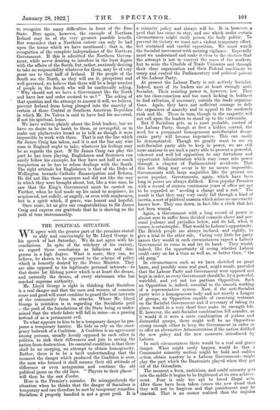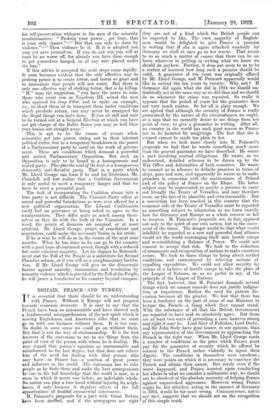THE POLITICAL SITUATION.
WE agree with the greater part of the premises stated so ably and convincingly by Mr. Lloyd George in his speech of last Saturday. We do not agree with his conclusions. In spite of the witchery of his oratory, we regard those conclusions as fallacious and dan- gerous in a high degree. What is more, they can, we believe, be shown to be opposed to the scheme of policy which is honestly desired by the Prime Minister. They are also opposed to his legitimate personal interests—to that desire for lifelong power which is at heart the dream, and naturally the dream, of every statesman who has reached supreme authority. Mr. Lloyd George is right in thinking that Socialism is a real danger and that the men and women of common sense and good will must combine to guard the best interests of the community from its attacks. Where Mr. Lloyd George is mistaken is in regarding the Socialistic peril —the peril of the foundations of the State being so under- mined that the whole fabric will fall in ruins—as a passing instead of as a permanent evil. To what appears to him to be a temporary danger he pro- poses a temporary barrier. He bids us rely on the emer- gency bulwark of a Coalition. A Coalition is an agreement among persons, usually keenly opposed to each other in politics, to sink their differences and join in saving the nation from destruction. Its essential condition is that there shall be no merging, no attempt to obtain homogeneity. Rather, there is to be a tacit understanding that the moment the danger which produced the Coalition is over, the men who formed it shall resume their old attitude of difference or even antagonism and continue the old political game on the old lines. " Players to their places " will then be the mot d'ordre.
Here is the Premier's mistake. He misapprehends the situation when he thinks that the danger of Socialism is temporary and can therefore be met by temporary remedies. Socialism if properly handled is not a great peril. It is a minority policy and always will be. It is, however, a peril that has come to stay, and one which under certain circumstances might easily poison the body politic. To prevent its victory we want not a violent temporary effort, but sustained and careful opposition. We must watch the Socialist movement with untiring vigilance. Especially must we understand and make it clear to the electors that the attempt is not to convert the mass of the workers, but to seize the Citadels of Trade Unionism and through their close organization and their Federal machinery to usurp and control the Parliamentary and political powers of the Labour Party.
At present the Labour Party is not actively Socialist. Indeed, most of its leaders are at heart strongly anti- Socialist. Their resisting power is, however, low. They are too class-conscious and too much lacking in boldness to find salvation, if necessary, outside the trade organiza- tions. Again, they have not sufficient courage to defy the organizers of anarchy and to appeal to the moderate rank and file. These in turn, though in the majority, will not call upon the leaders to stand up to the extremists. But if Socialism gets, as is most probable, control of the Labour Party, though at first a hidden control, the need for a permanent homogeneous anti-Socialist demo- cratic party will become imperative. This can easily be demonstrated. Though we greatly want to see an anti-Socialist party able to keep in power, we are still more anxious to see such a party able to present a powerful, coherent and well led opposition to any fortuitous and opportunist Administration which may come into power through a chapter of Parliamentary accidents. That this last thing may occur is by no means impossible. Governments with large majorities like the present are never popular. Governments, again, which have been long in power are always disliked. Even popular Premiers with a record of sixteen continuous years of office are apt to be regarded as " needing a change and a rest." The result is that they may very easily fall through a kind of inertia, a sort of political anemia which arises no one exactly knows how. They run down, in fact, like a clock that has not been wound.
Again, a Government with a long record of power is almost sure to suffer from divided counsels above and per- sonal jealousy and prejudice below, and its fall, when it comes, is catastrophic. That would be Labour's opportunity. The British people are always inclined, and rightly, to give a trial to the other side. Caring very little for party names they would in such circumstances expect a Labour Government to come in and try its hand. They would, indeed, like the opportunity of seeing whether Labour could carry on for a time as well as, or better than, " the old gang."
In circumstances such as we have sketched no great harm, and possibly some real good, might result, provided that the Labour Party and Government were opposed and kept in order, as every Government should be, by a powerful, watchful, and yet not too partisan Opposition. Such an Opposition is, indeed, essential to the smooth working of a representative system. Now, if the anti-Socialist party were a homogeneous body and not merely a League of groups, an Opposition capable of exercising restraint on the Socialist Government and if necessary of taking its place, would in a very short time make its strength felt. If, however, the anti-Socialist combination fell asunder, as it would if it were a mere combination of jealous and distrustful groups, there might well be no Opposition strong enough either to keep the Government in order or to offer an alternative Administration if the nation disliked the new policy and the new measures introduced by Labour.
In such- circumstances there would be a real and grave danger. What might easily happen would be that a Communist minority section might by bold and sudden action obtain mastery in a Labour Government—might play the part which the Dantonists played when they got rid of the Girondists.
The moment a keen, ambitious, and exalte minority gets into the saddle it begins to be frightened at its own achieve- ment. Fear is only too apt to breed illegal acts. After these have been taken comes the new dread that they will not be forgiven and that punishment may bo exacted. That is no sooner realized than the impulse for self-preservation whispers in the ears of the minority revolutionaries : " Proldng your power ; get time, that is your only chance."—" But that can only be done by violence."—" Then violence be it. If it is adopted you may yet save yourselves.. If you do not win you will at least be no worse off, for already you have done enough to get yourselves hanged, or at any rate placed under the ban."
If this advice is accepted the next steps come rapidly. It soon becomes evident that the only effective way to prolong power is to create terror, and terror so great and so immediate that people will not resist. But there is only one effective way of striking terror, that is by killing.. " If," runs the suggestion, " you have the nerve to seize those who resist you as Napoleon III. seized the men who opposed his coup d'etat, and to make an .example, i.e., to shoot them or, to transport them under conditions which preclude return, you may never be arraigned for the illegal things; you have done. If you sit still and wait to be turned out at a General Election at which you have not got charge of the Ballot Boxes you may as well blow your brains out straight away."
This is apt to be the course of events when minorities get into power, owing not to their inherent political virtue, but to a temporary breakdown in the power of a Parliamentary party to carry on the work of govern- ment. These are conditions which demand a powerful and united Parliamentary Opposition. But such an Opposition is only to be found in a homogeneous and united party. Th,erefere the need of the hour is a homogeneous democratic anti-Socialist party. That is, a party which Mr. Lloyd George can farm if he and his lieutenant, Mr. Churchill, will but -realize that a Coalition Government is only useful to meet a temporary danger and that we have to meet a perennial peril. The task of incorporating the Coalition atoms into a true party is not difficult. The Unionist Party offers as sound and powerful foundations as were ever offered for a new political organization. The Liberal Coalitionists could feel no grievance at being asked to agree to the amalgamation. They differ quite as much among them- selves as they do with the bulk of the Unionists. In a word, the points of disunion are nominal, or at most artificial. Mr. Lloyd. George, prince of conciliators and negotiators, could make the necessary fusion in his stride.
If he is wise he will do so in the course of the next nine months. When he has done so he can go to the country with a good hope of continued power, though with a reduced but more coherent majority. Let his slogans be Retrench- ment and the Poll,of the People as a substitute for Second Chamber reform, or if you will as a complementary Institu- tion. If Mr. Lloyd George will give us the democratic barrier against anarchy, communism and revolution by minority violence which is provided by the Poll of the People, he will prove a benefactor to his country beyond compare.



































 Previous page
Previous page